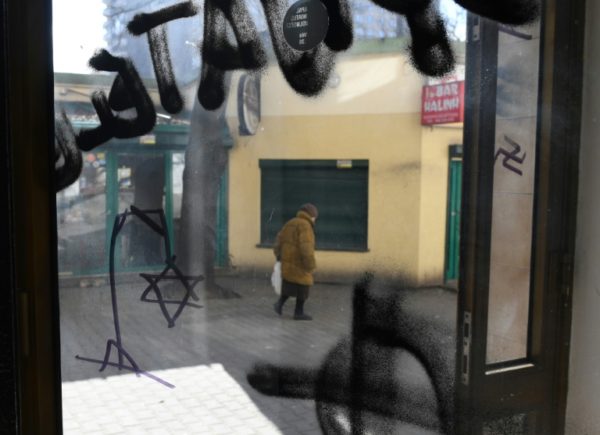Polish anti-Semitism festers on the internet


Graffiti of a swastika and the words “Jude Raus” (Jew, get out) recently appeared overnight on the headquarters of a liberal opposition movement in the Polish capital Warsaw.
The act of vandalism in late February is the latest sign that anti-Semitism persists in the EU member, even if it mostly rears its ugly head on the internet.
“Twenty years ago I would have said that anti-Semitism is on the wane but that’s no longer the case. The old stereotypes are resurfacing,” said Stanislaw Krajewski, a University of Warsaw professor and prominent member of the Jewish community.
“Anti-Semitism is still present in Poland. It’s part of the overall climate,” he told AFP.
“But it’s most aggressive on the internet. It doesn’t come up in my day-to-day life,” added Krajewski, who also co-founded an organisation for dialogue with Christians.
For his part, journalist Konstanty Gebert said he had never had cause for concern when walking around Warsaw in his yarmulke.
“Sometimes, very rarely, I get comments. I don’t respond and usually someone else answers for me,” he told AFP.
“In Paris, on the other hand, I was jostled a couple of times by young people. Other passersby just looked away.”
Jews first arrived in Poland in the Middle Ages, and for centuries the country was home to the world’s largest Jewish community.
However, the population was decimated during the Nazi occupation. Six million Poles died during World War II, half of them Jews.
Today, there are only around 8,000 to 12,000 Jews living in Poland, according to estimates.
– Tension with Israel –
Tensions have flared recently between Israel and Poland.
Last year, Warsaw passed a law that made it illegal to accuse the Polish nation or state of complicity in Nazi German crimes.
The move sparked an outcry from Israel, which sees it as an attempt to ban testimonials on Polish crimes against Jews. In response, Warsaw amended the law to remove the possibility of fines or a prison sentence.
Last month, Israeli Foreign Minister Israel Katz then drew Poland’s ire by saying “Poles suckle anti-Semitism with their mothers’ milk”.
Both incidents triggered a wave of hate speech on the internet in Poland, according to Konrad Dulkowski, head of an NGO that monitors racist and xenophobic behaviour.
“Unfortunately the comments confirmed in a way what Katz had said,” Dulkowski told AFP.
Last year, the European Union Agency for Fundamental Rights (FRA) released a survey on discrimination and hate crime against Jews in the EU.
Self-identified Jewish respondents from a dozen EU member states answered how often they had heard or seen non-Jews make anti-Semitic remarks like “Jews have too much power in (country)” or “Jews exploit Holocaust victimhood for their own purposes”.
In most of the survey’s sample statements, Poland had the highest percentage of respondents to report having witnessed anti-Semitism.
– ‘Two Polands’ –
Poland’s far right has expressed its ideas more openly since the conservative Catholic Law and Justice (PiS) party came to power in 2015.
In Gebert’s view, those currently in power are “schizophrenic” in their approach to the far right.
“PiS condemns anti-Semitism. (Its leader) Jaroslaw Kaczynski has even condemned anti-Zionism as a form of anti-Semitism,” Gebert said.
“Yet at the same time, the PiS needs around nine percent of the far-right vote. Its biggest nightmare is to have a local version of Hungary’s (far-right) Jobbik party appear in Poland.”
He said the far right enjoys implicit support from the governing conservatives, all in the name of freedom of expression.
“The fact that the far right doesn’t resort to violence is first and foremost because there are so few of us (Jews),” Gebert added.
But Krajewski pointed out that “at the same time, there’s an increasing awareness here of Jewish heritage and the desire to preserve it.”
As an example, he cited a recent contest from the Forum for Dialogue Among Nations — a foundation aimed at bringing Poles and Jews closer together — that garnered dozens of submissions from secondary school students.
“People don’t realise, even in Israel, that there are two Polands,” said Krajewski’s wife Monika, an artist and writer.
“There’s the anti-Semitic one but also the one that is fighting anti-Semitism.”










0 Comments